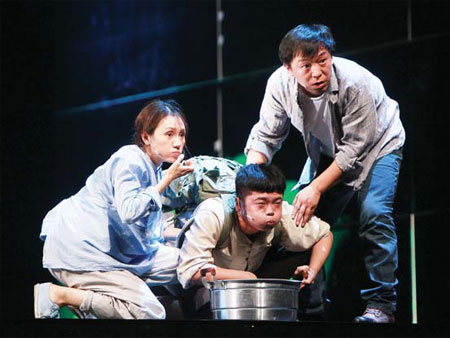IN BRIEF (Page 3)
Updated: 2013-08-16 09:00
(China Daily)
|
|||||||||||
|
Chinese director Meng Jinghui's latest work To Live, featuring comedian Huang Bo and actress Yuan Quan, will make its overseas debut in Germany in early 2014. Provided to China Daily |
CRIME
Drugs giant takes bribes claims 'seriously'
Allegations by a whistle-blower that the French pharmaceutical giant Sanofi-Aventis bribed more than 500 doctors in China in 2007 to boost its sales are being taken "very seriously" the company says.
On Aug 9 an anonymous whistle-blower told the newspaper 21st Century Business Herald that Sanofi staff paid about 1.69 million yuan ($276,000; 207,400 euros) in bribes to 503 doctors at 79 hospitals in Beijing, Shanghai, Hangzhou and Guangzhou in November 2007. The company also allegedly bribed 43 doctors at five hospitals in Beijing with cash payments and gifts each month from May to October in 2007.
The allegations come after four Chinese executives from the British drug firm GlaxoSmithKline were detained last month for suspected bribery and tax-related violations. China's top economic planner is now investigating 60 foreign and domestic pharmaceutical companies over their prices.
Employees accused of illegally obtaining data
About 300 employees of a company in Beijing have been detained on suspicion of illegally sourcing personal data to make a profit.
The suspects, from Tistina International Collection, are accused of using the data to off-load inferior collectibles, such as memorial coins and stamp albums, at high prices.
About 300 officers raided the company's office in Fengtai district on Aug 7, Beijing Public Security Bureau said.
Four hundred employees were initially questioned, and about 300 were arrested, it said.
Police said the company hired women to cold-call people whose data they had illegally obtained to sell the collectibles, and each employee made at least 200 calls a day.
Banned substance 'found in vet drugs'
The Ministry of Public Security says it has found the banned substance clenbuterol in veterinary drugs.
Jiangxi Hailian, a private enterprise in Haiyan county, Jiangxi province, that makes veterinary drugs, sold clenbuterol-laced drugs in 21 provinces and municipalities, the ministry said.
Eight main suspects, including the company manager, who was identified only by his surname of Xiong, were arrested, and police said they seized more than 4,000 boxes with 20 kinds of counterfeit drugs.
Six kinds of the counterfeit drugs containing clenbuterol were said to have been found.
The enterprise added the substance to the drugs to improve effectiveness and make more money, police said.
China forbids the production, sale and use of clenbuterol, which makes pigs leaner, because residue of the chemical in livestock will cause health problems in humans, such as dizziness, headaches, hand tremors and palpitations, food safety experts said.
TRADE
Big growth points to recovery in demand
Global investors got good news on Aug 8 as China's better-than-expected trade growth appeared to suggest world demand is recovering.
China's exports in July rose 5.1 percent year-on-year after sliding 3.1 percent in June, the General Administration of Customs said. Imports surged 10.9 percent, compared with the 0.7 percent decline in June.
"The July figures are satisfactory," said Huo Jianguo, president of the Chinese Academy of International Trade and Economic Cooperation, a government think tank.
"Exports returned to the normal growth track and the sharp rebound of imports signals the easing of downward pressure on the Chinese economy."
Global stock markets responded positively to China's data as shares jumped in Sydney, Seoul, Hong Kong and European cities on Aug 8.
The Chinese economy recorded its worst performance in 13 years in 2012, with GDP expanding 7.8 percent. Growth dipped to 7.7 percent in the January-March period and slowed further to 7.5 percent in the second quarter.
The July trade figures soothed worries that China's economy may experience a hard landing.
INTELLECTUAL PROPERTY
Rare-earth alliance to sue patent barrier
A dozen Chinese rare-earth companies have formed an alliance to sue Hitachi Metals of Japan for holding invalid patents and infringing patent rights of Chinese companies.
The legal process could start in early next month in the United States and China.
At the center of the dispute is something called a neodymium iron boron magnet, which accounts for half of rare earth consumption. The alloy magnet, mainly composed of neodymium, iron, boron and other microelements, is used in making motors, audio speakers, headphones, cordless tools and computer hard drives.
In August last year, Hitachi Metals asked the US International Trade Commission to stop the sales of such products and their downstream products that did not have a patent license in the country.
Three Chinese companies involved in the case finally reconciled with Hitachi Metals in May by paying a sum of money to gain the patent license. But Sun Baoyu, president of Shenyang General Magnetic Co and head of the coalition, said Hitachi Metals no longer has any right to claim the patents.
China Daily
(China Daily European Weekly 08/16/2013 page3)
Today's Top News
List of approved GM food clarified
ID checks for express deliveries in Guangdong
Govt to expand elderly care
University asks freshmen to sign suicide disclaimer
Tibet gears up for new climbing season
Media asked to promote Sino-Indian ties
Shots fired at Washington Navy Yard
Minimum growth rate set at 7%
Hot Topics
Lunar probe , China growth forecasts, Emission rules get tougher, China seen through 'colored lens', International board,
Editor's Picks

|

|

|

|

|

|






